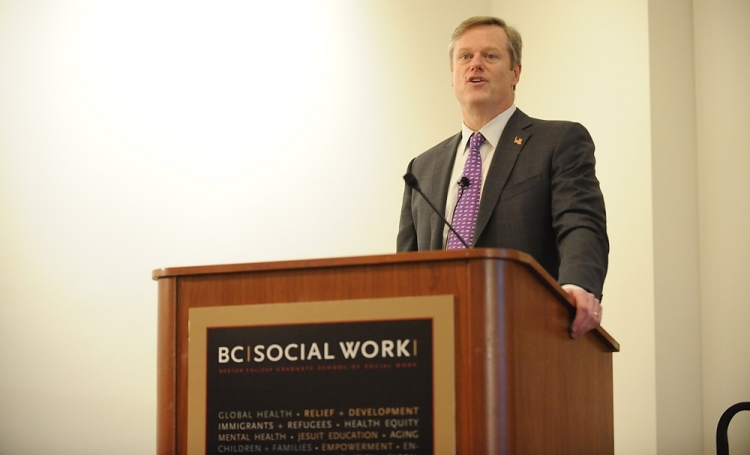
By Sean Smith | Chronicle Editor
Massachusetts gubernatorial candidate Charles D. Baker Jr., speaking at a Graduate School of Social Work forum Monday, endorsed the social work profession as a key player in health care reform.
“When I think of social workers, I think of problem-solvers,” said Baker, former CEO of Harvard Pilgrim Health Care, lauding social workers’ ability to “stitch clinical and social service issues together with real-life implications.
“They deal with the complexity of problems that don’t fit neatly into categories.”
Baker was the keynote speaker at “Health Care Reform: From Policy to Practice,” organized by GSSW to examine the potential roles and challenges for social workers in the wake of the Affordable Care Act (ACA). An audience of nearly 300, most of them social work professionals and academics, filled the Corcoran Commons Heights Room for the event, which also featured a panel discussion moderated by National Association of Social Workers CEO Angelo McClain PhD ’01, former commissioner for the Massachusetts Department of Children and Families.
GSSW Dean Alberto Godenzi and forum organizer Associate Professor of Macro Practice Marylou Sudders – a former Massachusetts commissioner of mental health – gave welcoming remarks at the start of the event.
Instead of delivering “a political stump speech,” Baker – who later took part in a brief Q&A session – said he wanted to offer his views on the ACA’s impact on social work and social workers, particularly in the areas of care management and therapy. He identified the expansion of coverage, the creation of health exchanges and cuts in Medicare as the “three big pieces” of ACA that would offer challenges and opportunities for social workers.
For example, expanded coverage would make more people eligible for care and treatment, he said, but also create potential dilemmas for what services can be provided, and in which form. Given this scenario, Baker strongly endorsed an emphasis on team-based approaches to health care issues, with specifically defined roles for each health care professional involved, and with measurement of outcomes built into the system.
Social workers would be a vital part of such cross-disciplinary work, he said, because their training tends to prepare them for a team-based approach better in comparison to other professions. “If everyone has a role, and if everyone plays a role, good things happen. This is a tremendous opportunity for all of you.”
Baker said social workers and other health care professionals must endeavor to change a model in which 50 percent of health care dollars are spent by a “reasonably healthy” 95 percent of the population, and the remaining 50 percent by a five percent who “are really sick and pinball all over the system.” He urged social workers to consider new, unconventional solutions for longstanding problems, and to seek viewpoints from outside their field – “people who don’t see the elephant the same way you do.”
Baker also said social workers should consider whether the culture of their particular organization or agency is attuned to problem-solving and team-based approaches. “Culture matters. Culture will crush strategy, always.”
His last piece of advice: “Trust your gut, but don’t ignore data.”
In his introduction to the panel discussion – which Sudders said would present a “boots on the ground” view of social work in the ACA era – McClain echoed Baker’s call for social workers to assert themselves into health care reform. Social workers’ training and education serve them well in other professions, he said, citing Under Secretary of State for Political Affairs Wendy Sherman, who holds an MSW degree and worked in the field before entering politics.
McClain said he has heard praise among many other health care professionals for social workers because of their combination of expertise – in areas such as holistic care, transitional situations and community living – and other qualities: “They’ll tell me, ‘Let’s start with empathy: You guys understand that very well.’”
Yet even though other health care professions “are playing ‘catch-up’” to social work in some respects, said McClain, “what I hear is that social workers always seem to devalue themselves. We must understand the power that we bring to address issues of health and social welfare, that we are part of a profession that does so much good for this country.”
Touching on Baker’s “five percent and 50 percent” comments, McClain said social work “can help change those numbers, get more pro-active treatment for that five percent. Integrated, interdisciplinary models will be key, and social workers will be right there because someone has to connect all the dots, get those linkages in place, find resources and follow up on them.”
Rounding out the forum was a panel discussion with four social workers – Carol Kress, Mary Neagle, Rebecca Osario and J. Scott Turton – involved in innovative pilot programs and initiatives that use the integrated physical-behavioral health model to address physical and mental health-related issues such as addiction.



